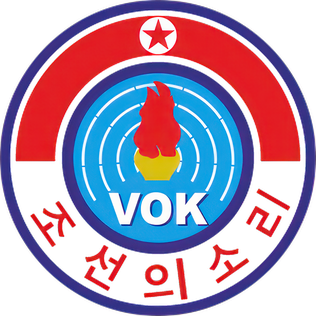Radio Pyongyang
 |
|
| Type | Radio network |
|---|---|
| Country | North Korea |
| Availability | International |
| Owner | Korean Central Broadcasting Committee |
|
Launch date
|
October 14, 1945 |
|
Former names
|
Radio Pyongyang |
|
Official website
|
www.vok.rep.kp |
| Voice of Korea | |
| Chosŏn'gŭl | 조선의 소리 |
|---|---|
| Hancha | 朝鮮의 소리 |
| Revised Romanization | Joseon-ui Sori |
| McCune–Reischauer | Chosŏn-ŭi Sori |
Voice of Korea (Chosŏn'gŭl: 조선 ; MR: Chosŏn-ŭi Sori) is the international broadcasting service of North Korea. It broadcasts primarily information in Chinese, Spanish, German, English, French, Russian, Japanese, and Arabic. Until 2002 it was known as Radio Pyongyang. The interval signal is identical to that of Korean Central Television.
The origins of Voice of Korea can be traced to 1936 and the radio station JBBK. Operated by the occupying Japanese forces, JBBK broadcast a first and second program as part of Japan's radio network that covered the Korean Peninsula from Seoul.
The station was founded in October 1945 as Radio Pyongyang, and officially inaugurated programming on the 14th, with a live broadcast of the victory speech of Kim Il-sung when he returned to Pyongyang at the end of World War II.
The first foreign broadcast was in Chinese on 16 March 1947. Japanese-language broadcasts began in 1950, followed by English (1951), French and Russian (1963), Spanish (1965), Arabic (1970), and German (1983).
By 1960, Radio Pyongyang broadcast 159 hours of programming every week. In 1970, weekly broadcasting hours totaled 330 hours and by 1980, 597 hours. In 1990 weekly broadcasting time fell to 534 hours per week, 529 in 1994, and 364 in 1996.
...
Wikipedia
